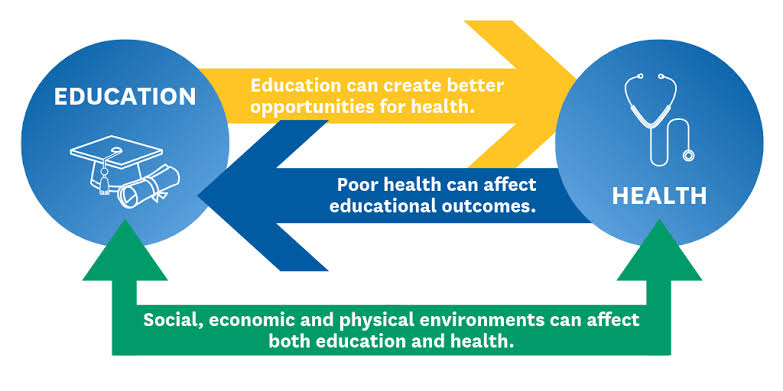Education and health are two fundamental and intertwined pillars of human development. In Nigeria, a country of over 200 million people with severe socioeconomic inequality, the impact of education on health outcomes has received increased attention. Education influences people's ability to make informed decisions about their health in addition to providing them with the knowledge and skills they need to lead satisfying lives. The impact of education on health outcomes must be considered in national policy discussions, given the country's challenges with high rates of maternal and infant mortality, disease burden, and inadequate healthcare infrastructure.
Recognising the Connection Between Health and Education
Education includes a wide range of cognitive and social skills that enable people to understand information, seek the right care, and adopt preventive health behaviours. It goes beyond simply acquiring academic knowledge. Higher educated people are more likely to comprehend health information, seek medical attention, and adopt healthier lifestyle choices. In Nigeria, where infectious diseases like HIV/AIDS, TB, and malaria still pose a threat to public health, education is essential in giving people the skills they need to defend themselves and their loved ones. Additionally, those with higher levels of education are more likely to follow vaccination schedules, seek prompt medical attention, and participate in routine health examinations.
The Impact of Education on the Health of Mothers and Children
Maternal and child health is one of the most significant ways that education affects health in Nigeria. Nigeria continues to have one of the highest rates of maternal mortality in the world, with thousands of women losing their lives to avoidable complications during childbirth each year. Poor prenatal care, a lack of trained birth attendants, and a lack of knowledge about maternal health are all factors in a significant number of these deaths. Higher educated women are more likely to look for and make use of prenatal and postpartum care. Additionally, they have greater control over reproductive health decisions, such as family planning and birth spacing, which lowers the risks of high-risk or closely spaced pregnancies.
Practices of Nutrition and Hygiene
Nutrition and hygiene are two more areas where education has a big influence on health outcomes. In Nigeria, malnutrition is still a major problem, especially for children under five. In many rural and underdeveloped communities, stunting, wasting, and underweight conditions are common. Although poverty is a significant factor, the issue is made worse by a lack of education, particularly in the area of nutrition. People with higher levels of education are more likely to comprehend the significance of food safety, micronutrient supplements, and a balanced diet. Additionally, they have greater knowledge about good sanitation habits like washing their hands, drinking safe water, and disposing of waste, all of which lower the risk of waterborne infections and diarrhoeal illnesses. In areas where there is a shortage of clean water and open defecation is still common,
Using Health Literacy to Fight Infectious Diseases
Among the many public health issues Nigeria faces are frequent outbreaks of infectious diseases like meningitis, cholera, and Lassa fever. Public awareness and adherence to health recommendations are critical for the effective prevention and control of disease. Higher levels of education improve health literacy, which in turn improves a person's capacity to comprehend risks, process health information, and take appropriate action. Public health education campaigns, for example, were essential in reducing false information and promoting preventive measures like handwashing, mask wearing, and social distancing during the 2014 Ebola outbreak and the more recent COVID-19 pandemic. While misinformation and mistrust were more common in places with lower educational attainment, informed communities reacted more swiftly and responsibly. This illustrates how crucial education is for enhancing resilience.
Disparities in Education by Gender
Despite the fact that education generally improves health outcomes, gender differences in educational attainment remain problematic in Nigeria. Particularly in northern Nigeria, girls encounter many obstacles to education, such as poverty, cultural and religious norms, and early marriage. These obstacles have a negative impact on their health and the health of their future families in addition to limiting their educational opportunities. Early marriage frequently results in early childbearing, raising the risk of maternal mortality, infant mortality, and obstetric complications. These young girls are less likely to have access to or comprehend information regarding nutrition, disease prevention, and reproductive health if they are not educated. Therefore, closing the gender gap in education is not only a social justice issue but also a health necessity.
Access to Healthcare and Economic Empowerment
Economic empowerment and education are directly related. People with more education are more likely to be able to afford high-quality healthcare and land better-paying jobs. This financial benefit can save lives in Nigeria, where paying for healthcare out of pocket is a significant obstacle to access. People with higher levels of education are also more likely to be able to obtain health insurance, be aware of their rights when it comes to healthcare, and speak up for themselves and their families in medical settings. The impact of education on community health is also multiplied. People with higher levels of education are more likely to demand accountability from government agencies and healthcare providers, take part in civic life, and support public health initiatives. Their opinions influence health policy and guarantee the fair and effective distribution of public funds.
